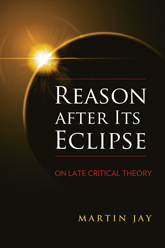Reason after Its Eclipse
On Late Critical Theory
Martin Jay
George L. Mosse Series in Modern European Cultural and Intellectual History
Steven E. Aschheim, Stanley G. Payne,
Mary Louise Roberts, and David J.
Sorkin, Series Editors
Martin Jay tackles a question as old as Plato and still pressing today: what is reason, and what roles does and should it have in human endeavor? Applying the
tools of intellectual history, he examines the overlapping, but not fully compatible,
meanings that have accrued to the term “reason” over two millennia, homing
in on moments of crisis, critique, and defense of reason.
After surveying Western ideas of reason from the ancient Greeks through
Kant, Hegel, and Marx, Jay engages at length with the ways leading theorists of
the Frankfurt School—Horkheimer, Marcuse, Adorno, and most extensively
Habermas—sought to salvage a viable concept of reason after its apparent eclipse.
They despaired, in particular, over the decay in the modern world of reason into
mere instrumental rationality. When reason becomes a technical tool of calculation
separated from the values and norms central to daily life, then choices
become grounded not in careful thought but in emotion and will—a mode of
thinking embraced by fascist movements in the twentieth century.
Is there a more robust idea of reason that can be defended as at once a philosophical
concept, a ground of critique, and a norm for human emancipation? Jay
explores at length the communicative rationality advocated by Habermas and
considers the range of arguments, both pro and con, that have greeted his work.
 Martin Jay is the Sidney Hellman Ehrman Professor of History
at the University of California, Berkeley. He is the author
of fourteen previous books, including The Dialectical Imagination:
A History of the Frankfurt School and the Institute of Social
Research, 1923–50, which has been translated into thirteen languages;
Marxism and Totality: The Adventures of a Concept from
Lukács to Habermas; Adorno; Permanent Exiles: Essays on the Intellectual Migration
from Germany to America; Downcast Eyes: The Denigration of Vision in Twentieth-
Century French Thought; Songs of Experience: Modern European and American
Variations on a Universal Theme; and The Virtues of Mendacity: On Lying in Politics.
Martin Jay is the Sidney Hellman Ehrman Professor of History
at the University of California, Berkeley. He is the author
of fourteen previous books, including The Dialectical Imagination:
A History of the Frankfurt School and the Institute of Social
Research, 1923–50, which has been translated into thirteen languages;
Marxism and Totality: The Adventures of a Concept from
Lukács to Habermas; Adorno; Permanent Exiles: Essays on the Intellectual Migration
from Germany to America; Downcast Eyes: The Denigration of Vision in Twentieth-
Century French Thought; Songs of Experience: Modern European and American
Variations on a Universal Theme; and The Virtues of Mendacity: On Lying in Politics.
Praise
“Jay writes with enormous erudition, insight, fairness, good judgment and clarity. . . . Anyone interested in the vicissitudes of the history of the understanding of reason in the Frankfurt school, anyone interested in gaining an overview of Habermas’s communicative theory of rationality, anyone interested in the ambiguous legacy and future prospects for Critical Theory will benefit from Jay’s masterful study.”
—History and Theory
“What Jay has done, admirably, in the final three chapters, is provide a subtle and nuanced introduction to debates surrounding the evolution and nature of reason in contemporary Critical Theory.”
—Marx & Philosophy Review of Books
“Focuses on ideas of reason in the work of Frankfurt School theorists, including Adorno, Horkheimer, Marcuse, and especially Habermas.”
—Chronicle of Higher Education
“Martin Jay is one of the most respected intellectual historians now working, and any book by him is an important event. His subject here could hardly be bigger: the idea of reason in Western thought over two millennia.”
—Michael Rosen, Harvard University
“A magisterial rethinking of the
fate of reason, particularly in
German philosophy from Kant to
Habermas.”
—Anson Rabinbach,
Princeton University
|

Larger images
New in Paperback!
September 2017
LC: 2015010451 B
272 pp. 6 x 9
|

